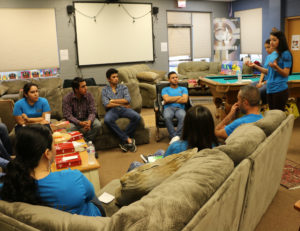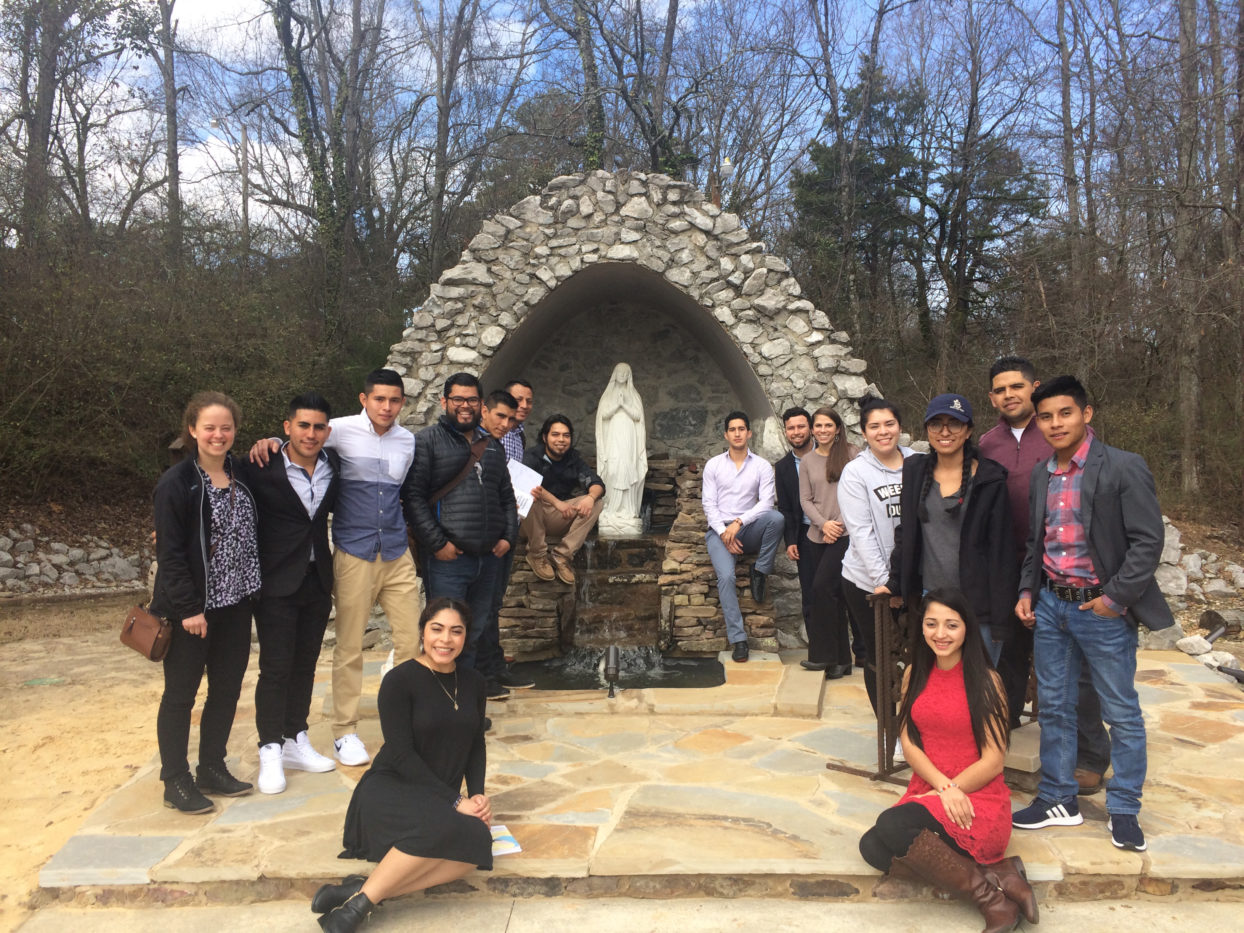Program leader believes dialogue, diversity can engage and unite young people in the Diocese of Knoxville
By Emily Booker
A common question in the Church today is “How do we reach young people?” With more young people leaving the Church or growing up without religion, connecting with the next generation can feel like a looming challenge.
Pastoral Juvenil Hispana is a ministry that takes on that challenge by providing space in the Church for young people of Hispanic/Latino heritage to express their spirituality and culture.
Brittany García, coordinator of Pastoral Juvenil Hispana for the Diocese of Knoxville, hopes to give Hispanic youth and young adults a space to express themselves, gain leadership skills, and most importantly, grow in their faith.
“Pastoral Juvenil Hispana — it is a distinct ministry. It is not just youth ministry or young adult ministry in Spanish. And a lot of people are confused about that. It’s not like we’re doing the exact same thing but in Spanish,” she said.
“Spanish is often their spiritual language, the language that they pray in even if they are bilingual… But it goes deeper than that because there is so much culture that language is not the only factor.”
She said many Hispanic young people are trying to balance having one foot in Hispanic/Latino culture and one foot in mainstream American culture. Pastoral Juvenil is a space where that struggle is understood, and they can express their faith in a way that feels most authentic.
Pastoral Juvenil meetings follow a general structure that provides time for prayer, games, music, and teaching, but it adapts to the needs and desires of the group. Mrs. García explained that the ministry tries not to have one leader but rather encourages the young people to lead themselves.
“You let the young people come up with the ideas, and you’re kind of guiding them but letting them fail, too. You say, ‘Why don’t you try it? See how it goes.’ But more of that is giving them space to rise up as leaders, giving them space to own the group, to take ownership of it,” she said.

Participants in Pastoral Juvenil Hispana engage in a group discussion about issues and activities pertaining to Hispanic youth.
Several parishes in the diocese have Pastoral Juvenil ministries for youth and young adults. Some may wonder why a parish with an active youth group would need a Pastoral Juvenil youth group.
“There’s a mentality out there that youth ministry is one group,” Mrs. García said. “In the USCCB document Renewing the Vision on Youth Ministry we are encouraged to have several ministries for youth as well and not to expect a one-size-fits-all ministry model.”
Just as adult parish groups are diversified — for women, men, prayer, social justice, music, hospitality, Bible study, etc. — youth and young adult ministry needs multiple avenues to reach the maximum number of people.
“We have this vision of youth ministry being one group, but really that’s not what our Church preaches,” she said. “It’s that unity in plurality is the way of the Catholic Church — the universal Church with all the cultures.”
“It’s hard in the U.S. because of our perspective of a melting pot. I think it comes from a very good intention of wanting unity; we want to be together. But the way that we see unity in the U.S. is often uniformity, that we’re all meant to be one group, so that’s why it’s hard to see the unity in plurality,” Mrs. García said.
“For intercultural ministry, it’s rather based on the salad bowl, where the tomatoes remain tomatoes and the croutons remain croutons and the lettuce remains lettuce, but together it has a better flavor… All of these are just different expressions of the same faith and a different way to engage it,” she added.
With multiple ministries, young people are able to choose where they most resonate, which helps keep them involved in the parish and growing spiritually. From there, ministries can build bridges, working together and helping support one another, in order to build a stronger parish where more people feel included.
Pastoral Juvenil Hispana also connects young people to the larger Church through national and regional events. These events provide resources to take back to parishes as well as a stage for parishes to share their successes to help others.
La Red, which means “The Net” in Spanish, is the national organization for Pastoral Juvenil Hispana. Member dioceses send representatives to the annual membership meeting. In November, the Diocese of Knoxville sent four representatives to the national meeting in Chicago.
At the meeting, Mrs. García was elected secretary of the executive committee for La Red. She previously served two years as a vocal, or member-at-large, on the board. The new position comes with more responsibility in helping plan national meetings. La Red is entirely volunteer-based.
The keynote speakers were young people, mostly from the Chicago area, sharing how Pastoral Juvenil Hispana had impacted their lives. The meeting also offered breakout sessions focusing on a range of topics affecting young people today.
The diocese also participates in events on a regional level.
The Southeast Pastoral Institute (SEPI), the regional office for Hispanic Ministry in the Southeast, offers a nine-day Pastoral Juvenil training course, which teaches leadership techniques and how to communicate in groups. The diocese has participated twice in this course.
SEPI also hosts a book workshop each year, with young people guiding the creation of a book, Libro de la Pascua. Pascua means Easter in Spanish; traditionally the book was compiled during the Easter season.
“The young people themselves participate in picking a title for the book, the theme of the book, and then we break it down into chapters,” Mrs. García said. “The whole work of this entire book is done by the young people themselves in the Southeast. And every single year there’s a new book, new theme, new focus, and different chapters.”
The book includes testimonials, prayers, and reflections on Church documents and Scripture. At the final workshop, everyone receives a copy of the book and learns how to use it as a resource with other young people in their own parishes. This year, the Diocese of Knoxville had 15 young adults representing the diocese at these book workshops.
“Even though 15 worked directly on the book, there are many more that benefit from the book because these are representatives from different groups that will then go back and work this book with the whole group that wasn’t able to come,” Mrs. García explained.
While these events are educational and provide resources to bring back and implement in the diocese, work at the national level also serves as an opportunity to share the successes from the diocese in order to help others.
On Oct. 16, Mrs. García spoke at the Mission Bishops Conference organized by Catholic Extension. The 70 or so bishops attending all represented mission dioceses in the United States. Mrs. García served on a three-person panel discussing Pastoral Juvenil. She focused on her background of being raised in an evangelical Protestant church, and what lessons Catholics can learn from our Protestant brothers and sisters regarding ministry.
Catholic Extension also shared a video on Pastoral Juvenil filmed in the diocese. Jim Wogan, director of communications for the Diocese of Knoxville, provided footage of Pastoral Juvenil meetings at St. Thomas the Apostle Church in Lenoir City and St. Patrick Church in Morristown.
Mrs. García also had the opportunity to speak on the main stage at the National V Encuentro in Grapevine, Texas, this fall. She was on a panel discussing the fruits of the Encuentro in reaching young adults.
“It was really special, really humbling, because our diocese — you know, 2.7 percent Catholic — was about to be represented on the main stage at that event, and I felt like that was just really incredible, how they invited us to be a part of that as a diocese, a small mission diocese that got to be a part of this national event.”
She shared with more than 3,000 attendees from all over the country how the Diocese of Knoxville had used the Encuentro as an opportunity to listen to and accompany young people and hear what their needs and wants from the Church were.
One example of this is a retreat for Catholic school students held in May 2017 at Christ Prince of Peace Retreat Center in Benton. The retreat focused on engaging young leaders in grades 7-12 in the Encuentro process.
“We realized a lot of young people weren’t really as involved on the parish level as we hoped, because the focus was youth and young adults,” Mrs. García said. “That was an effort to engage more young people. It was an effort between the Catholic Schools Office, Pastoral Juvenil, the Youth and Young Adult Ministry Office, and Hispanic Ministry — so those four ministries coming together to host this one-day retreat for Catholic school students.”
Many youth at that retreat expressed that music and sports events would help them engage their friends and family members who currently weren’t engaged in the Church. From that listening session came the Diocesan Soccer Tournament, now in its second year. Mrs. García said they also are working to incorporate more music at retreats and times for praise and worship at events in response to the youths’ requests.
“From that we were like, ‘OK, we’ve listened to the youth. Now let’s listen to the young adults,’” Mrs. García said. “And when I listened to the young adults, their priority, No. 1 overall, was leadership and faith formation — that they were hungry for that. They needed that.”
In response to that, she was able to arrange for Instituda Fe de Vida, the Institute of Faith and Life, to come to the diocese and lead a series of weekend courses on leadership and faith formation in Pastoral Juvenil.
“We’re seeing a lot of fruit from listening through the V Encuentro, listening to what the youth and young people are saying their needs are and from there being able to act on them. We think it will keep bearing fruit in the future,” she said.
Being able to share the successes of Pastoral Juvenil in the diocese on a national level is rewarding. And it shows that the lessons and techniques for engaging young people learned at national and regional events are being brought back and implemented where they are most needed: the parishes.

